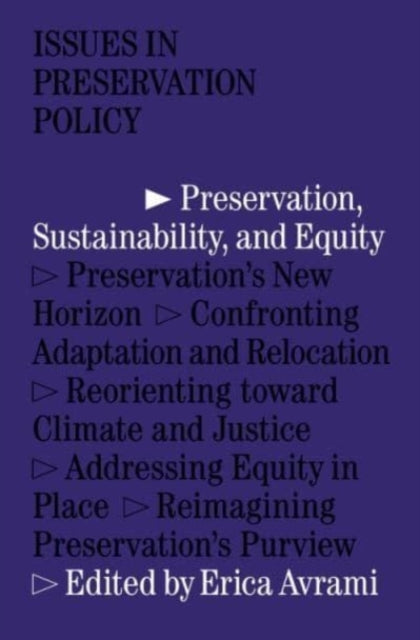Erica Avrami
Preservation, Sustainability, and Equity
Preservation, Sustainability, and Equity
YOU SAVE £4.20
- Condition: Brand new
- UK Delivery times: Usually arrives within 2 - 3 working days
- UK Shipping: Fee starts at £2.39. Subject to product weight & dimension
Bulk ordering. Want 15 or more copies? Get a personalised quote and bigger discounts. Learn more about bulk orders.
Couldn't load pickup availability
- More about Preservation, Sustainability, and Equity
Heritage is important, but the legacies of racial, economic, and social injustice and the climate crisis are challenging it. This third volume in the Issues in Preservation Policy series examines historic preservation as an enterprise of ideas, methods, institutions, and practices that must reorient toward a new horizon, one in which equity and sustainability become critical guideposts for policy evolution.
Format: Paperback / softback
Length: 234 pages
Publication date: 01 June 2022
Publisher: Columbia Books on Architecture and the City
Heritage holds a unique place within the built environment, and governments worldwide have implemented laws and policies to safeguard it from physical decline and the forces of change. However, this privilege is increasingly being challenged by the legacies of racial, economic, and social injustice in both the built environment and historic preservation policy, as well as the escalating climate crisis. While many heritage projects and practitioners are addressing these issues in innovative ways, systemic change necessitates a broader perspective that goes beyond the formal and material aspects of place and considers the processes and outcomes of preservation policy at various scales, in different socio-geographic contexts, and in relation to the intended publics.
This third volume in the Issues in Preservation Policy series delves into historic preservation as an enterprise that requires a reorientation towards a new horizon. Equity and sustainability must become central guiding principles for policy evolution in this context. The book brings together contributions from esteemed scholars and practitioners, offering insights and perspectives on the challenges and opportunities facing historic preservation.
In the opening chapter, Lisa T. Alexander explores the historical roots of historic preservation and its relationship to power, privilege, and inequality. She argues that the field has often been shaped by dominant narratives and ideologies that have marginalized certain groups and communities. Alexander highlights the need for a more inclusive and equitable approach to historic preservation that recognizes the diverse experiences and perspectives of all stakeholders.
Louise Bedsworth and Ken Bernstein examine the role of heritage in promoting social cohesion and community identity. They argue that heritage can be a powerful tool for bridging divisions and fostering a sense of belonging, particularly in times of social and political unrest. Bedsworth and Bernstein suggest that heritage preservation should be approached as a means of promoting social justice and equity.
Robin Bronen, Sara C. Bronin, Shreya Ghoshal, Scott Goodwin, Claudia Guerra, Victoria Herrmann, James B. Lindberg, Randall Mason, Jennifer Minner, David Moore, Marcy Rockman, Stephanie Ryberg-Webster, A.R. Siders, Amanda L. Webb, and Vicki Weiner contribute chapters that explore various aspects of historic preservation policy and practice. They address topics such as the preservation of cultural heritage, the conservation of historic buildings, the management of historic sites, the integration of sustainability into preservation, and the challenges of preserving marginalized and underrepresented communities.
Throughout the book, the authors emphasize the importance of interdisciplinary collaboration and the need to engage with diverse publics and communities. They argue that historic preservation should be a participatory process that involves the active involvement of local residents, stakeholders, and cultural heritage organizations. By engaging with these groups, preservation practitioners can ensure that policies and practices are responsive to the needs and values of the communities they serve.
In conclusion, Heritage occupies a privileged position within the built environment, but the legacies of racial, economic, and social injustice and the climate crisis are challenging this privilege. This third volume in the Issues in Preservation Policy series provides valuable insights and perspectives on historic preservation as an enterprise that must reorient towards equity and sustainability. By examining the processes and outcomes of preservation policy at various scales, in different socio-geographic contexts, and in relation to the intended publics, the book contributes to the ongoing dialogue about the future of heritage preservation.
Weight: 348g
Dimension: 238 x 150 x 16 (mm)
ISBN-13: 9781941332702
This item can be found in:
UK and International shipping information
UK and International shipping information
UK Delivery and returns information:
- Delivery within 2 - 3 days when ordering in the UK.
- Shipping fee for UK customers from £2.39. Fully tracked shipping service available.
- Returns policy: Return within 30 days of receipt for full refund.
International deliveries:
Shulph Ink now ships to Australia, Belgium, Canada, France, Germany, Ireland, Italy, India, Luxembourg Saudi Arabia, Singapore, Spain, Netherlands, New Zealand, United Arab Emirates, United States of America.
- Delivery times: within 5 - 10 days for international orders.
- Shipping fee: charges vary for overseas orders. Only tracked services are available for most international orders. Some countries have untracked shipping options.
- Customs charges: If ordering to addresses outside the United Kingdom, you may or may not incur additional customs and duties fees during local delivery.


